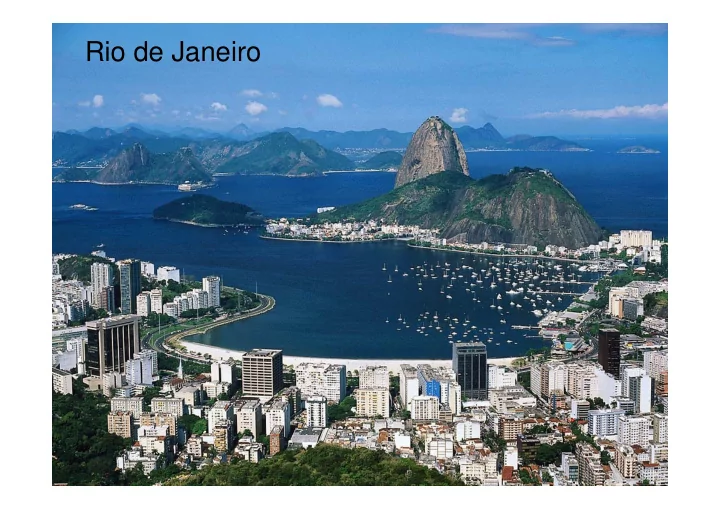

Rio de Janeiro AARHUS UNIVERSITY DEPARTMENT OF POLITICAL SCIENCE
AARHUS UNIVERSITY A GLOBAL CO 2 TAX FOR SUSTAINABLE DEVELOPMENT? CARBON LEAKAGE, RENEWABLE ENERGY AND COALITIONS Urs Steiner Brandt & Gert Tinggaard Svendsen (accepted, Journal of Sustainable Development) DEPARTMENT OF POLITICAL SCIENCE 2
AARHUS UNIVERSITY Outline: 1. Introduction 2. Tax and renewable energy 3. Lobbying 4. The socio-economic impact 5. Conclusion DEPARTMENT OF POLITICAL SCIENCE
AARHUS UNIVERSITY 1. Introduction 1.1 Rio+20 (2012) Twin goal: i) Facilitate growth of green industries ii) Enhance quality of institutions DEPARTMENT OF POLITICAL SCIENCE
AARHUS UNIVERSITY 1.2 Research question Non-productive negotiations…simple solution? “Can a CO 2 tax secure the Rio+20 twin goal at the global level?” Gap: Cost-effective and politically feasible! DEPARTMENT OF POLITICAL SCIENCE
AARHUS UNIVERSITY 2. Tax and Renewable Energy 2.1 Tax Economists: Green taxation (Pigou 1920) Figure 1, global CO 2 tax DEPARTMENT OF POLITICAL SCIENCE
AARHUS UNIVERSITY CO 2 Taxation €/unit MC t* A B q* CO 2 reduction DEPARTMENT OF POLITICAL SCIENCE
AARHUS UNIVERSITY 2.2 Renewable energy How does a global CO 2 tax affect the potential shift from non-renewable to renewable energy (green economy)? Figure 2: Switch point. DEPARTMENT OF POLITICAL SCIENCE
AARHUS UNIVERSITY From fossil fuels to renewable energy when taxing CO 2 €/MW MC fossil + tax MC fossil P MC renewable CO 2 tax Time t 0 t * DEPARTMENT OF POLITICAL SCIENCE
AARHUS UNIVERSITY 3. Lobbying 3.1 Winners/Losers Economic part: ”green light” for the global use of CO 2 taxation. What about the political feasibility? DEPARTMENT OF POLITICAL SCIENCE
AARHUS UNIVERSITY Consumers: Potential winners (tax revenue can be used to lower distortive taxes). Producers: Losers (reduction costs and tax payments). Asymmetry. DEPARTMENT OF POLITICAL SCIENCE
AARHUS UNIVERSITY 3.2 Negotiations So far not possible to introduce a common CO 2 tax in the EU or the US! Main argument: loss of jobs. DEPARTMENT OF POLITICAL SCIENCE
AARHUS UNIVERSITY ”Carbon leakage” China/India! Competitiveness, however, not ruined when all countries are taxed the same (uniform)! DEPARTMENT OF POLITICAL SCIENCE
AARHUS UNIVERSITY 3.3 New coalitions “Brown” industry vs. environmental groups. Brandt and Svendsen (2002): How wind turbine producers joined forces with environmental organizations in promoting ambitious target levels for renewable energy. DEPARTMENT OF POLITICAL SCIENCE
AARHUS UNIVERSITY 3.4 Administration simple Possible to implement global CO 2 taxation even when national institutions are “bad”. CO 2 tax basically a ‘painted’ energy tax according to CO 2 content in fossil fuels. DEPARTMENT OF POLITICAL SCIENCE
AARHUS UNIVERSITY Developing countries may find CO2 taxation highly attractive as a tool to collect taxes. Tax revenue may be invested in better institutions, for example by fighting corruption efficiently. DEPARTMENT OF POLITICAL SCIENCE
AARHUS UNIVERSITY 4. The socio-economic impact 2009 Copenhagen meeting (COP15): Limit the increase in global mean temperature below 2 degrees Celsius (compared to 2000). Carbon tax in the 2 degrees scenario? How this tax will affect various countries and how are the incentives to reduce emissions? DEPARTMENT OF POLITICAL SCIENCE
AARHUS UNIVERSITY Carbon price Carbon price in the 2 degrees scenario (Nordhaus, 2010) (2010 prices, $/ton CO 2 ) Year 2015 2025 2035 2045 2055 2105 CO 2 tax ($/ton) 24.24 43.63 69.32 107.04 160.04 277.18 DEPARTMENT OF POLITICAL SCIENCE 18
AARHUS UNIVERSITY IPAT – measure We illustrate the consequences of a tax for different countries by use of the IPAT identity. This identity is given by DEPARTMENT OF POLITICAL SCIENCE 19
AARHUS UNIVERSITY For CO 2 emissions, we plug in: � � DEPARTMENT OF POLITICAL SCIENCE 20
AARHUS UNIVERSITY � Given emission in country i , and uniform �� � tax rate � , total tax payment (revenue) in � is given by: country i ( � � � � � �� � Inserting: � � � �� � � � � � � DEPARTMENT OF POLITICAL SCIENCE 21
AARHUS UNIVERSITY IPAT measures for four countries 10$/ton CO 2 tax (2009 numbers). Countries GDP CO 2 pop GDP/pop CO 2 /GDP t*CO 2 /GDP taxpayment/pop ($) (ton) ($) Ton/$ 1.39E+13 5.3E+09 3.07E+08 45305.1 3.81E-04 3.81E-03 172.7 USA 9.05E+12 7.69E+09 1.33E+09 6797.8 8.49E-04 8.49E-03 57.7 China 3.73E+12 1.98E+09 1.19E+09 3132.9 5.31E-04 5.31E-03 16.6 India 2.11E+11 4.57E+07 5.52E+06 38268.0 2.16E-04 2.16E-03 82.7 Denmark DEPARTMENT OF POLITICAL SCIENCE 22
AARHUS UNIVERSITY The main effect of a CO 2 tax › Red arrow indicates how a tax moves countries towards a lower CO2/GDP path DEPARTMENT OF POLITICAL SCIENCE 23
AARHUS UNIVERSITY Reasons We consider that the (main) reason for this is that the tax-system punishes inefficient use of fossil fuels (column 8, taxpayment/pop). While the US does not have any significant price on carbon, there are several price mechanisms in place for Denmark such as CO 2 taxes and other energy taxes combined with the European Emission Trading System. DEPARTMENT OF POLITICAL SCIENCE 24
AARHUS UNIVERSITY Further consequences i) Punish inefficient energy usage: The CO 2 /GDP in the US and China will decrease following the CO 2 tax because the tax system punishes inefficient usage of fossil fuels. ii) Eliminating leakage: Some of the Danish reduction in CO 2 might be caused by leakage effects. Such effects will be eliminated in the global uniform tax system. DEPARTMENT OF POLITICAL SCIENCE 25
AARHUS UNIVERSITY 5. Conclusion Bold conjecture: A global CO 2 tax should be considered to meet the two main challenges of green economy and better institutions from Rio+20. DEPARTMENT OF POLITICAL SCIENCE 26
AARHUS UNIVERSITY Economically: double dividend Politically: carbon leakage and new coalitions Administratively: simple, even bad institutions. DEPARTMENT OF POLITICAL SCIENCE 27
AARHUS UNIVERSITY Policy recommendations Future climate negotiations: Define specific and binding global CO2 target levels and tax at the right level. If somebody cheats, supranational authority such as WTO (potential trade sanctions)… DEPARTMENT OF POLITICAL SCIENCE 28
Recommend
More recommend